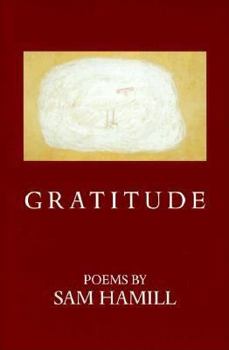Gratitude
Select Format
Select Condition 
Book Overview
Poems that "let the song arise as it will," while showing that we must "learn to revise the life."
Format:Paperback
Language:English
ISBN:1880238659
ISBN13:9781880238653
Release Date:August 1998
Publisher:BOA Editions
Length:90 Pages
Weight:0.50 lbs.
Dimensions:0.5" x 6.0" x 9.0"
Customer Reviews
2 ratings
Bring your gratitude and much knowledge of Asia
Published by Thriftbooks.com User , 15 years ago
Sam Hamill is a poet and translator of poetry in Japanese and Chinese and this certainly shows in his collection of poems, Gratitude. Unfortunately for the reader, most of these references are not explained with footnotes on the page (they at the end, a most tedious process of flipping back and forth). In general, this mars the reading of this collection for the non-specialist. One must bring some specific knowledge of Chinese and Japanese poetry to distill their meaning. That said, many of the poems are finely wrought and delicate. Hamill has a way of making the mundane sacred and the sacred mundane. This is a clever trick. A few of the poems suffer from sentiments and language which are cliché. But stuffed into the exotic Asian flavor of the whole, it hardly makes this a poor collection of poetry. Quite the contrary, for a reader who wishes to do a little work, there is a good return for the effort.
Poetry By a Big Fool
Published by Thriftbooks.com User , 22 years ago
... In his latest collection Port Townsend poet Sam Hamill speaks as Obaka-san, or "big fool" - an honorific that Japanese friends gave him, recalling the nickname of the early writer Ryokan. Like Shakespeare's wise fools and Nietzsche's Wise Child, Obaka-san surrenders to life instead of trying to manipulate, buy, or sell it. And like the Zen and Ch'an poet-calligrapher-monks of old, he makes his home everywhere and noplace, with a community of artists spanning the centuries. In "Gratitude" we meet these friends - in letters and elegies the poet sends them, in his translations of their writings, and in epithalamia celebrating their children's marriages. More precisely, Hamill, his friends, and the reader meet in the sociable situation his pages provide. Creating spaces where readers and poets living and dead can gather has been his life work as Editor of Copper Canyon Press, Director of the Port Townsend Writers' Conference, author of over thirty books, and translator of Latin, Estonian, Japanese, and Chinese poetry. Gratitude can be read as Hamill's gift of thankfulness for being able to devote himself to these labors. But if we open it to find a certain something for ourselves - a newly carved insight for our mental treasury, a voice that will set our deeper beliefs to music, a self-enhancing mirror of our life or a soothing escape from it - we'll miss the poems. The painting on the cover of Hamill's book, Morris Graves' "Little Known Bird of the Inner Eye," suggests another approach. This creature's feathers blend so imperceptibly into surrounding cloud, and its slender features are such fleeting glimpses in the whiteness, that we realize the bird not by looking for it in the painting but by letting it meet our alert yet unexpectant regard, like the selfless gaze we rest lightly, wholeheartedly, on a friend in close conversation. Indeed, speaking these poems aloud as if in quiet talk with a friend is the way to know them; for the poetry communicates "The heart by way of the ear" and asks the reader, in turn, "What's that you wanted to say?" ('Preface: Ars Poetica') - as in this excerpt:This world is neither / fair nor wise, but paradise / reveals itself in every line.What, finally, IS love? / Willingness to face the end / without blinking? ('Lives of a Poet')Hamill's loose and easy Chinese-style couplets, Japanese-derived tanka, and free verse let the poems unfold as spontaneously as good conversation. Still, there is rhyme (so subtle we may have dreamed the sound preceding the echo) through which the words can enact, instead of merely declaring, the connectedness of everything. In being the speaker of the poems, we merge with their life and move with their changes. We grasp the poetry by letting go.The best poems in "Gratitude" slow us and quiet us down for themselves, each one becoming (as Basho put it) the only poem in the world. How good the only poem in the world is! And the next one, and the next.





